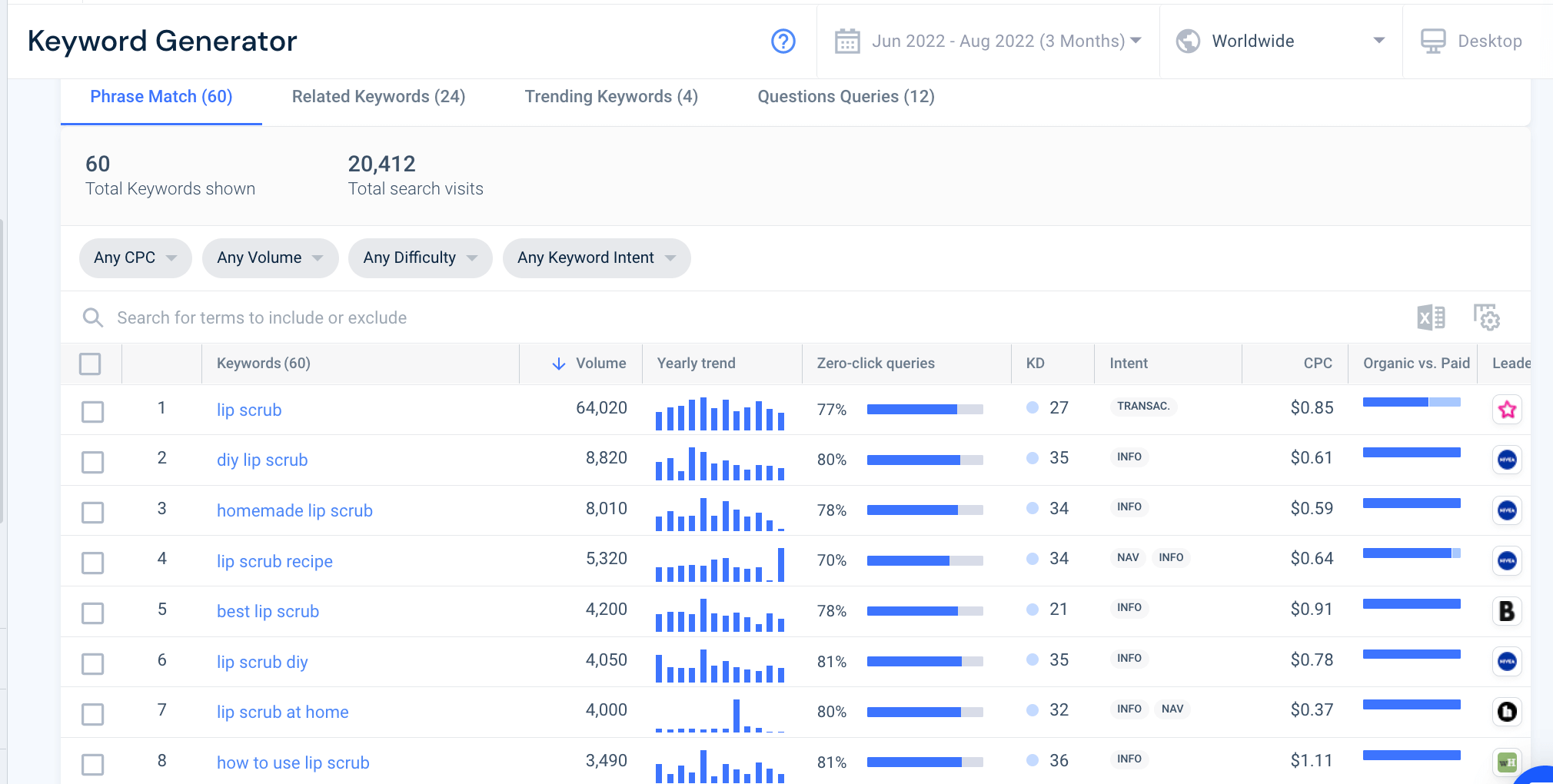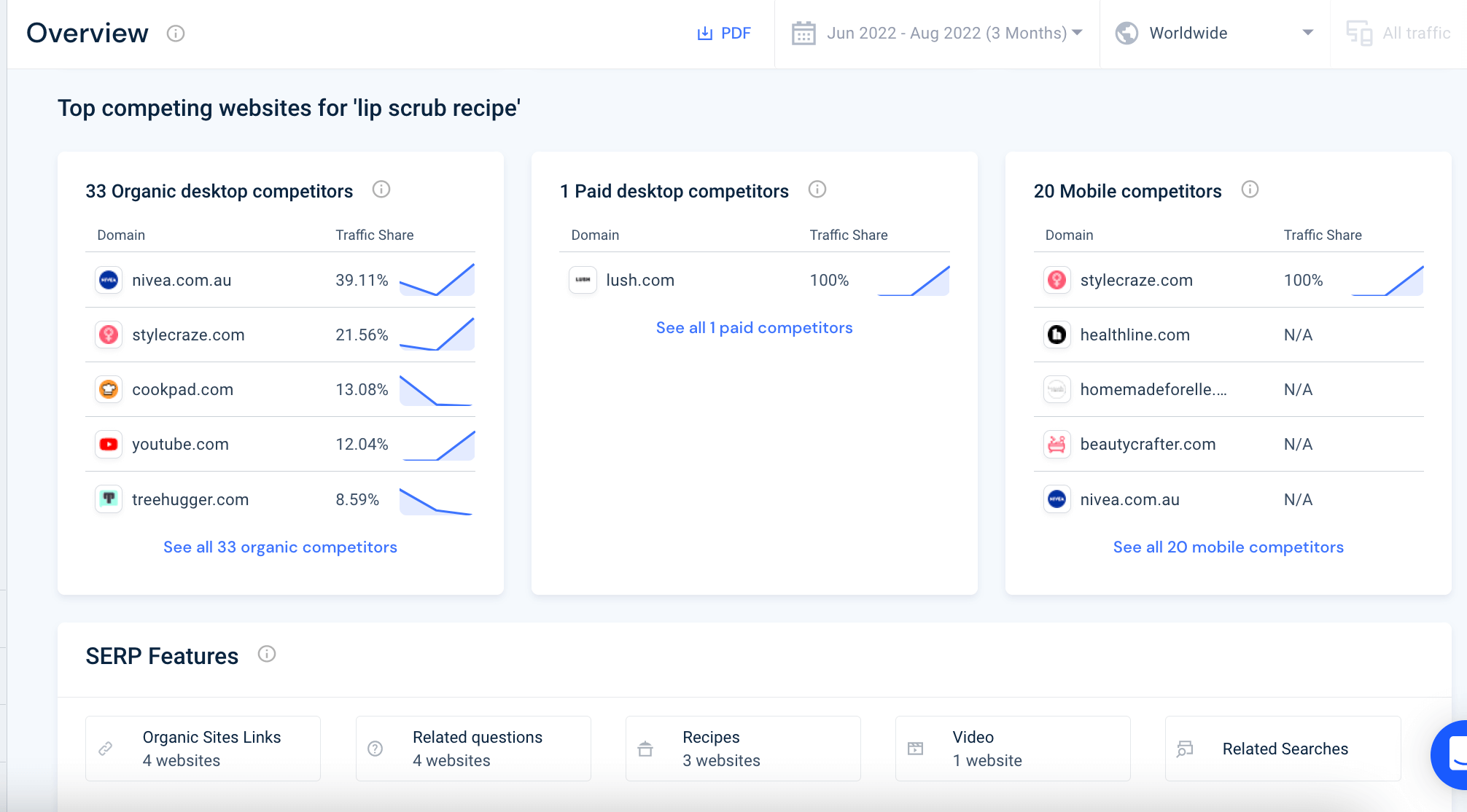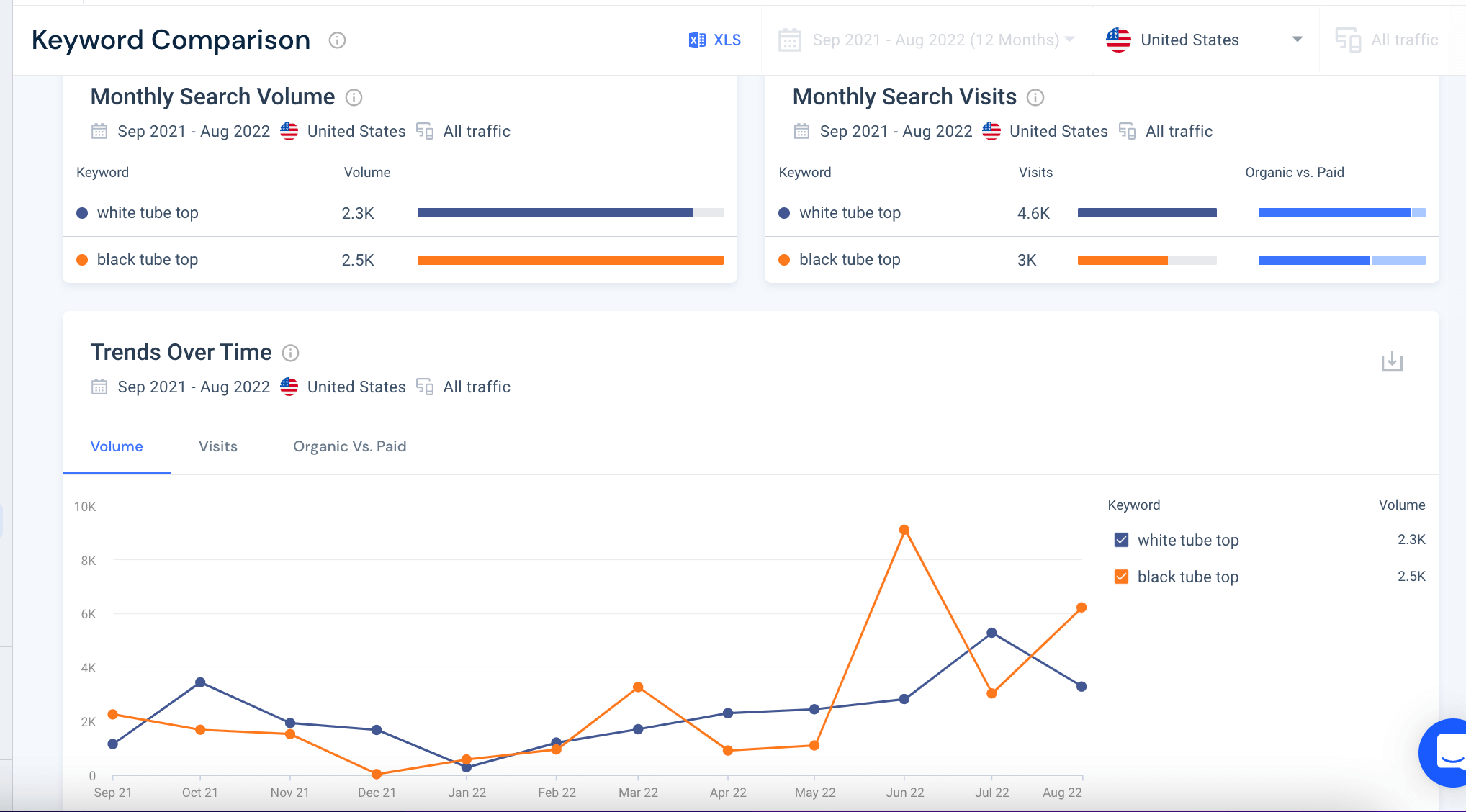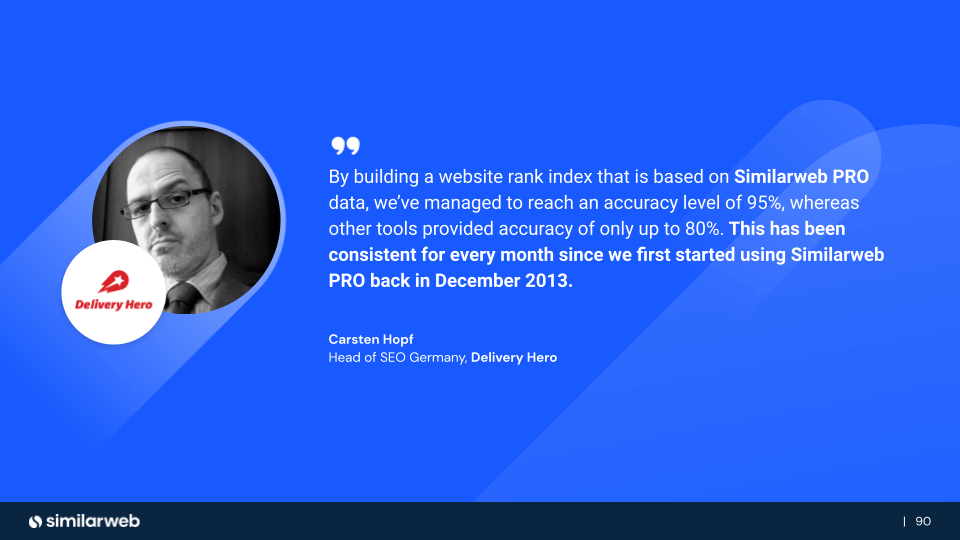How to Generate Keyword ideas for SEO That Actually Drive Traffic

In this article, we’ll show you how to find the best keywords to target and how to find them.
But wait, what does “the BEST keywords” even mean? It’s a pretty vague term. I mean, what do you think – which of the below options are most applicable?
The best keywords are:
- Keywords that provide the highest possible organic search potential
- Keywords that get you into a SERP feature
- Keywords that drive maximum traffic potential
- Keywords that lead to maximum conversions
- All the answers are correct
Your answer really depends on your specific priorities for your content, doesn’t it? – We go for all answers.
So, what will you get from this article? You’ll discover ways to generate ideas for new keywords and where to find them. Next – and that’s the exciting part – we’ll demonstrate the depth and detail of data you can get with an advanced keyword generator tool and why that’s critical. You’ll also learn which factors matter most.
How to get keyword ideas?
This is the fun part (if you like role-playing). To find ways to get keyword ideas, you first need to switch roles and jump into your ideal customer’s shoes. What would you do if you were them, what would you be interested in, and what would get you excited?
You can then identify keywords related to these areas and topics. There are various techniques to generate keyword ideas, and it’s probably best to do a bit of everything. For each approach, there are web tools available.
Find new SEO keywords through trending content
If you know your audience, you know where they look for information or gossip related to your product type, service, or industry.
Try typing “what’s trending in [your industry sector],” and Google will spit out a trending products list or alternatively, an article with what’s trending.
You can check popular social media pages and blogs to see what your niche is talking about. Surprisingly, (or maybe not so surprising) Reddit is a good place to discover current gossip and discussion topics. The platform is structured according to areas of interest, and you can filter new or hot content. Other social media tools offer hashtags that you can investigate.
Use Google functions to find SEO keywords for your website
The simplest way to get help from Google is by letting it autocomplete what you type into the search bar. You’ll instantly get the most used terms, which can be very inspirational.
You can use Google Trends to see what’s hot. Type in a keyword and see what other related terms and topics people are searching for.
How to get keyword ideas for Amazon
Amazon’s search algorithm functions differently than Google’s. But then, people also search differently on Amazon. Whoever comes to the giant digital marketplace intends to purchase something – or do some window shopping and price comparing. That means using keywords with informational or navigational intent is less effective on Amazon.
To find new keywords for Amazon, you can use the same method as for Google: Type your main keyword in the Amazon Keyword tool search bar. This is even more useful on Amazon because the platform is organized according to product categories and subcategories.
When you type a product category into the search bar, you get all the subcategories. Each subcategory is a potential SEO keyword for you. Imagine what you could do with more data about them?
How to find new keywords for YouTube
YouTube has grown into somewhat of a search engine, functioning according to the Google SEO concept. However, in many cases, people search differently for video content.
The motivation for watching a video is not the same as when searching for a term on Google. People come to YouTube for different reasons and expectations, which reflects in the words they use for search.
Similarweb’s YouTube Keyword tool specializes in generating YouTube keyword ideas for video content. It shows the most popular search terms on YouTube, and generates many more keyword ideas, based on exact match and related terms, to help you optimize your videos.
How to generate SEO keywords with a free keyword generator
In recent years, free keyword generator tools have popped up in different shapes and sizes. Remember the intimidating guy from AnswerThePublic? He’s turned into a robot. The tool provides keyword-related popular search queries and their variations.
AlsoAsked is a similar tool with a slightly more intuitive display. If you just want to get a list of the most-searched, related queries, there are tools such as Keyword Sheeter. The results are basically the same from all these tools.
What’s missing?
Most free tools do not offer data that lets you identify search intent, measurable search volume, audience demographics, or any other basic insights. All you get is the keywords and their variations. That’s also what many free versions of other paid tools offer.
Tools that let you analyze your website’s keyword data and do keyword research on your pages often lack something else: competitor data. But that is precisely where your golden nuggets are buried.
If you know what works for your competition, there’s an enormous opportunity for you. Do what the competition does, just better – use the keywords the competition uses, just more efficiently.
What does an advanced keyword generator tool offer?
The purpose of a keyword generator is to provide you with additional valuable keywords to target. An advanced keyword generator has all the data you need to identify high-potential keywords and decide how to incorporate them into your SEO strategy.
The keyword generator lets you focus on the relevant search engine and finds SEO keywords that include an exact match of the terms you examine. Discover long-tail keywords that may not come to mind spontaneously. You should also get related keywords and phrases (that aren’t an exact match, but a synonym, different spelling or otherwise similar) to widen the search for SEO keywords.
An advanced keyword generator should show the following metrics:
- Search volume per keyword with the volume trend
- Zero-click queries and keyword difficulty
- Search intent
- Organic vs. paid search traffic
- Cost per click (CPC)
You should also get relevant filters that allow you to hone in on a specific level for any metric. A professional keyword tool also lets you dive into a complete keyword analysis and link to the related web pages.
How to generate keywords with Similarweb keyword generator tool
How does that look in practice? Let’s take a random example and see how to generate new keywords with the Similarweb keyword generator.
Did you pay attention to the first image on this page? It dealt with natural cosmetics, and one of the trending items was “lip scrub”. Let’s see how that looks when we put it in the keyword generator and what we find.
Number one metric to look at: search volume
This kind of goes without saying, but we need to give search volume the status it deserves: it’s vital. High volume means lots of people use the keyword in search and you should prioritize them. Similarweb Keyword Generator, unlike other tools, gives you exact search and traffic data for every keyword – It’s time to forget about Google search volumes buckets (and all the tools that use it)!
Similarweb keyword generator shows there are 60 exact matches that include “lip scrub”. You can check 24 additional related keywords and 12 question queries, and you can see which 4 keywords are trending.
Face the zero-click challenge to organic search
The first thing that jumps at you is that all keywords with an exact match have an extremely high percentage of zero-click searches – up to 80%.
This is critical to notice because it impacts the probability of receiving organic traffic for these keywords. Zero-click searches generate an instant result on the SERP, meaning people get what they were looking for on the Google results page and don’t click to any other page.
In this case, the SERP displays product ads, followed by a featured snippet, and a people also ask box. Next, you can find a bunch of featured videos, and only when you scroll beyond them do you get organic results. Considering the high traffic volume, you might still want to add some of these keywords to your SEO plan.
Zero-Click searches have become a big issue, but the keyword generator can help you deal with the challenge.
Find new SEO keywords and analyze their performance
Click on a keyword, and you’ll get an overview of keyword analysis. You can identify who’s competing for this keyword for organic and paid search, and for desktop vs. mobile search.
The keyword analysis also shows you which SERP features the keyword generated and for how many sites, in which countries the search is popular, and which industry categories are receiving traffic for the keyword.
This is a partial view of the keyword analysis overview showing competitors and SERP features. You can dig into each to see the feature, the content, and who posted it.
Pay attention to the search intent of SEO keywords
Another critical factor you need to consider from the start is search intent. Search intent determines what motivates the majority of searchers to type in a specific term.
For example, someone typing “Samsung Flip 3 price” is likely interested in buying the flippable mobile phone and not looking for instructions on how to use it.
To find new SEO keywords for your blog, product page, or video content, you want to make sure searchers use them with the right intent.
Also, check keyword difficulty to assess your chances of ranking high on the SERP. These metrics help you prioritize the keywords for your SEO and plan the content effectively.
Other tools to help you generate new SEO keywords
Keyword Gap tool for more SEO keyword ideas
Your competitors’ keywords are gold, and the keyword gap tool helps you dig them up. Similarweb’s keyword gap tool identifies keywords that drive traffic to your competitors’ websites but not your website. Unlike other keyword research tools that only show gaps in keyword ranking, with Similarweb you get to gauge if the ranking pays off and brings visitors.
The tool offers a ton of useful filters, so you don’t get distracted with irrelevant branded keywords, can focus on medium or low-difficulty keywords, high level of search volume, and more.
Keyword Comparison to put keyword ideas side-by-side
With the keyword comparison tool, you can view critical metrics for up to five keywords side-by-side. This is especially useful when you have several well-performing keywords and want to fine-tune your strategy for each one.
Another scenario where this tool is super helpful is when you want to choose the primary keyword for a piece of content. The keyword comparison tool lets you refine keyword performance analysis to pinpoint the specific term with the highest traffic potential. Compare two (or more) similar keywords to see which gets more traffic. Compare that to the number of visits (second graph) to see how valuable the exposure is.
Caption:
Contrary to other keyword generators and research tools, Similarweb doesn’t rely on Google for data. Keyword data on Similarweb is collected independently at a large scale in different methods. Because we measure actual web activity, we can provide the most reliable and accurate metrics for SEO research.
Similarweb also doesn’t bucket keywords but instead, displays metrics for each specific keyword. For example, when you use Google or another keyword generator, they don’t differentiate between a keyword’s singular and plural. And that’s just one example.
Organic pages to snatch competitors’ keywords
This is a personal favorite. In the Similarweb digital marketing intelligence platform, you can see your competitors’ top organic pages and the keywords that drive traffic to them. All you need to do is enter your competitor’s (or competitors) URL and the tool produces the list including relevant traffic data. You see the keywords responsible for your competitors’ organic traffic and voila! You’ve got some new ideas for additional keywords that can help you outperform them.
Make generating keyword ideas a habit
What we’ve presented here is just a fraction of the work that’s involved in creating lists of keywords for SEO. Finding the right keywords to fuel your SEO strategy isn’t trivial; you need to get serious if you want to win the top ranks on SERP.
Without fresh, accurate data, it’s impossible to beat the competition and convince search engines.
Don’t just take our word for it. Read our customers’ opinions.
FAQs
What is a keyword generator?
A keyword generator is a digital tool that helps you find more keywords for your SEO. Based on a keyword you enter into the generator, it finds similar and related terms that people search for on the web.
How to use a keyword generator?
To make the most out of a keyword generator, you’ll enter your existing keywords or keyword ideas into the tool and then analyze the keyword ideas you receive. You want to look at search volume, keyword difficulty, and other significant metrics.
What data do I get from a keyword generator?
An advanced keyword generator lets you conduct a complete keyword analysis for the terms it generates for you. Besides search volume and keyword difficulty, the tool may provide a zero-click percentage, search intent, SERP features, CPC, and more.
The #1 keyword research tool
Give it a try or talk to our marketing team — don’t worry, it’s free!



















